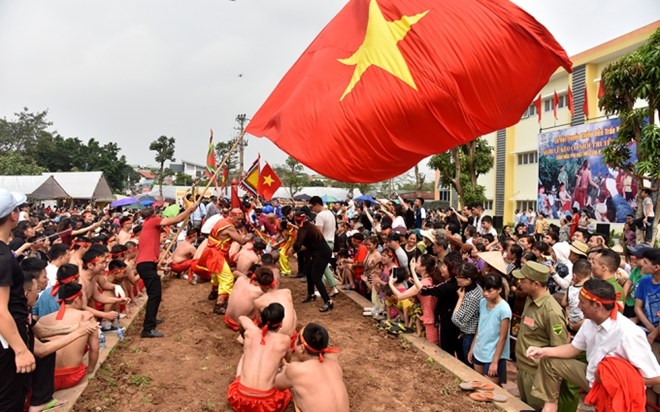
A ceremony was held in Thach Ban ward, Hanoi's Long Bien district on April 7 to receive a certificate of UNESCO recognition of the sitting tug-of-war games and rituals at local Tran Vu temple as part of the Representative List of the Intangible Cultural Heritage.
A ceremony was held in Thach Ban ward, Hanoi’s Long Bien district on April 7 to receive a certificate of UNESCO recognition of the sitting tug-of-war games and rituals at local Tran Vu temple as part of the Representative List of the Intangible Cultural Heritage.
The ceremony took place within the annual traditional festival of Tran Vu temple.
On this occasion, Nguyen Van Se, who has greatly contributed to preserving the folk games and rituals, was presented with the President’s decision recognising him as an outstanding artisan.
Apart from Vietnam, tug-of-war games and rituals of Cambodia, the Republic of Korea and the Philippines also won UNESCO recognition.
A Vietnamese delegation is scheduled to visit the RoK in mid-April to engage in exchanges with local tug-of-war teams.
Tug-of-war rituals and games are prevalent in the rice-farming cultures of East Asia and Southeast Asia as a form for communities to pray for abundant harvests and prosperity. They mark the start of the agricultural cycle and often begin with commemorative rites to local deities.
Typically held near a communal house or shrine, two teams on either end of a rope try to tug it from the other. The practice is non-competitive, strengthening community solidarity and identity, UNECO said on its website.
 |
| Tug-of-war is typically held near a communal house or shrine, two teams on either end of a rope try to tug it from the other. (Photo: nhandan.com.vn) |
On this occasion, Nguyen Van Se, who has greatly contributed to preserving the folk games and rituals, was presented with the President’s decision recognising him as an outstanding artisan.
Apart from Vietnam, tug-of-war games and rituals of Cambodia, the Republic of Korea and the Philippines also won UNESCO recognition.
A Vietnamese delegation is scheduled to visit the RoK in mid-April to engage in exchanges with local tug-of-war teams.
Tug-of-war rituals and games are prevalent in the rice-farming cultures of East Asia and Southeast Asia as a form for communities to pray for abundant harvests and prosperity. They mark the start of the agricultural cycle and often begin with commemorative rites to local deities.
Typically held near a communal house or shrine, two teams on either end of a rope try to tug it from the other. The practice is non-competitive, strengthening community solidarity and identity, UNECO said on its website.
(Source:VNA)





